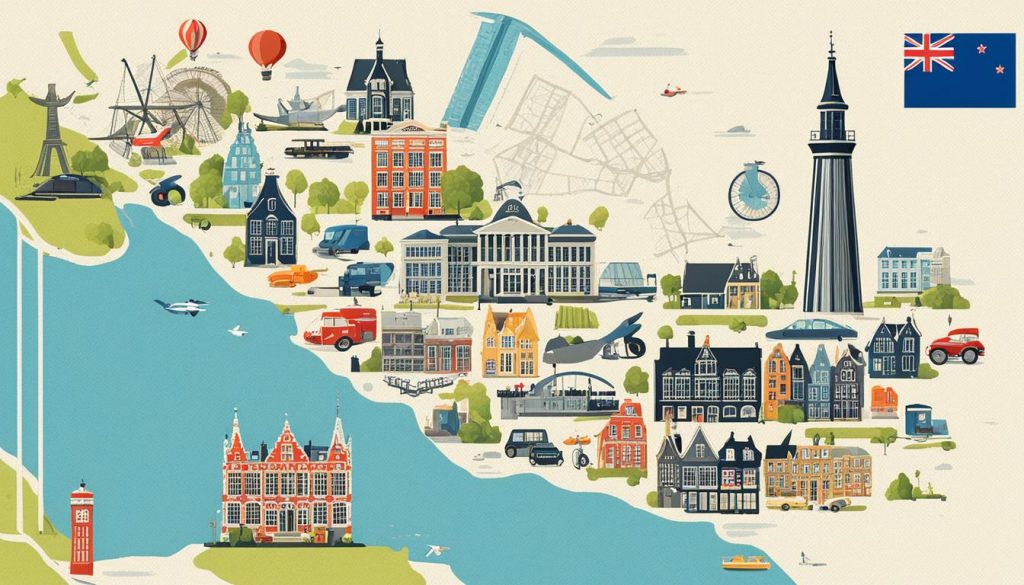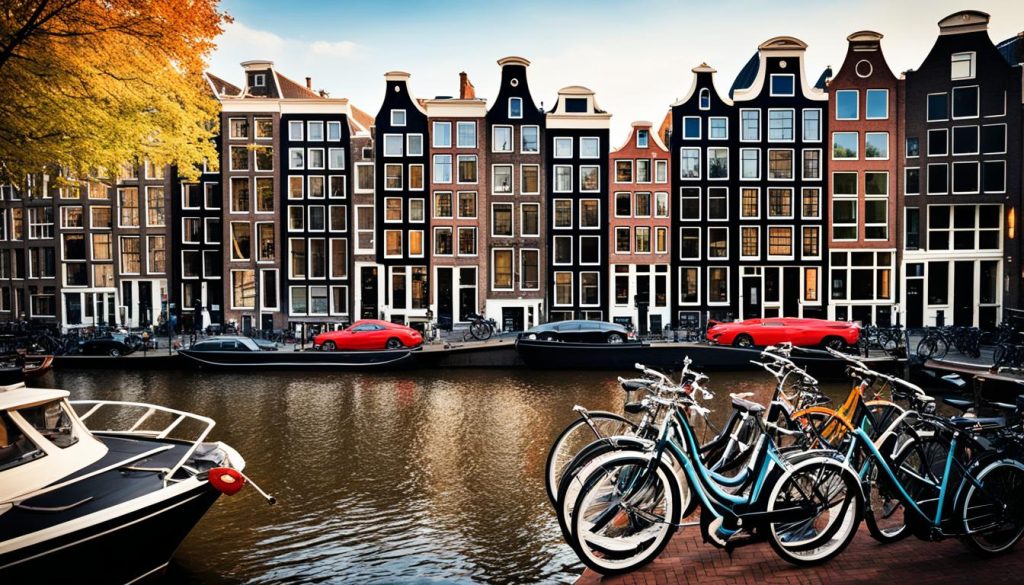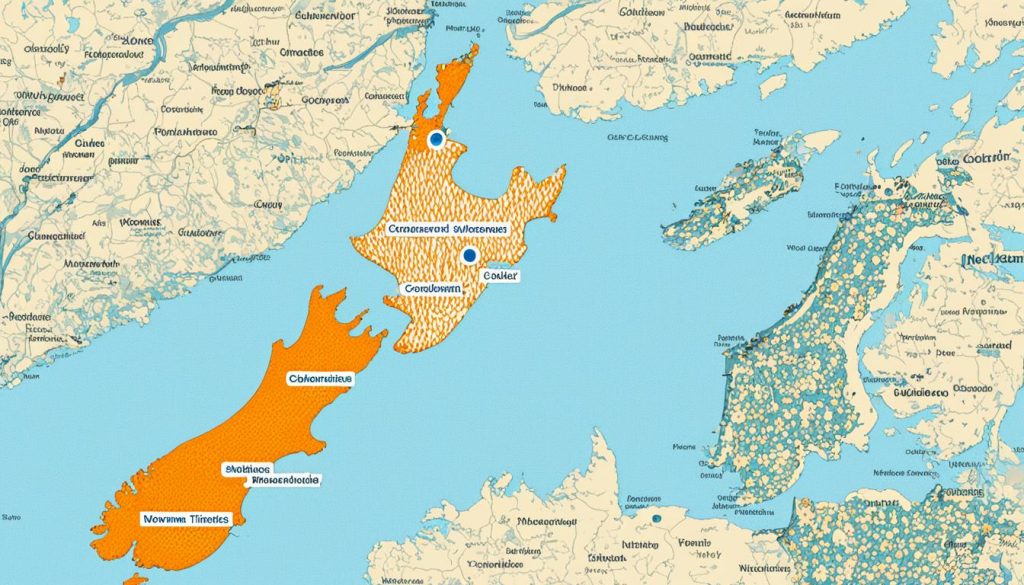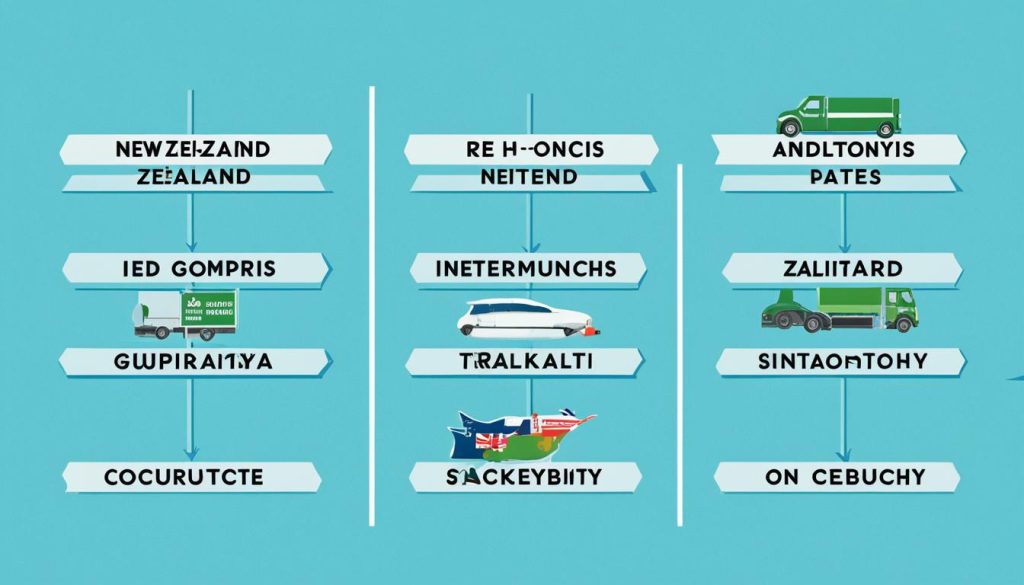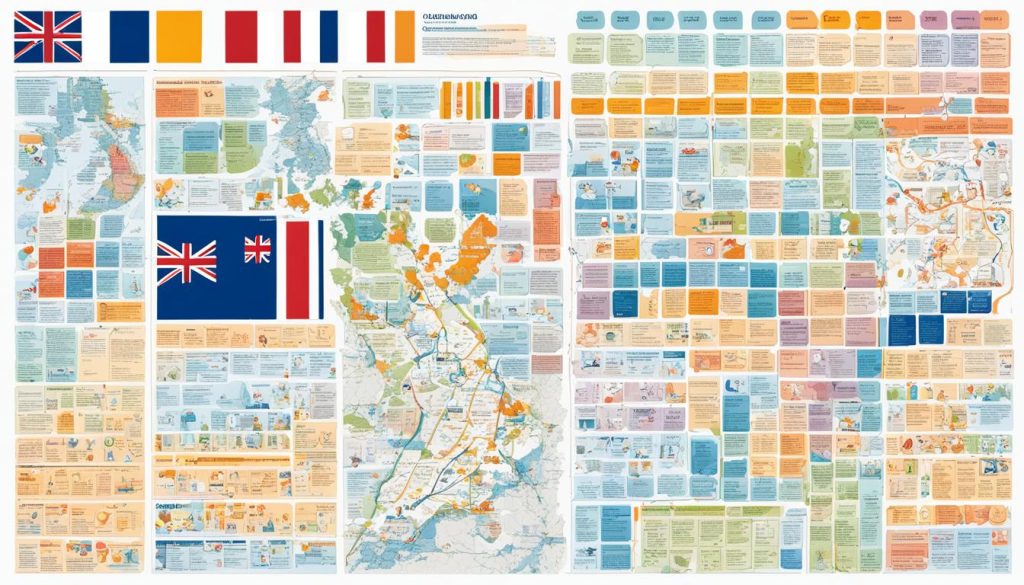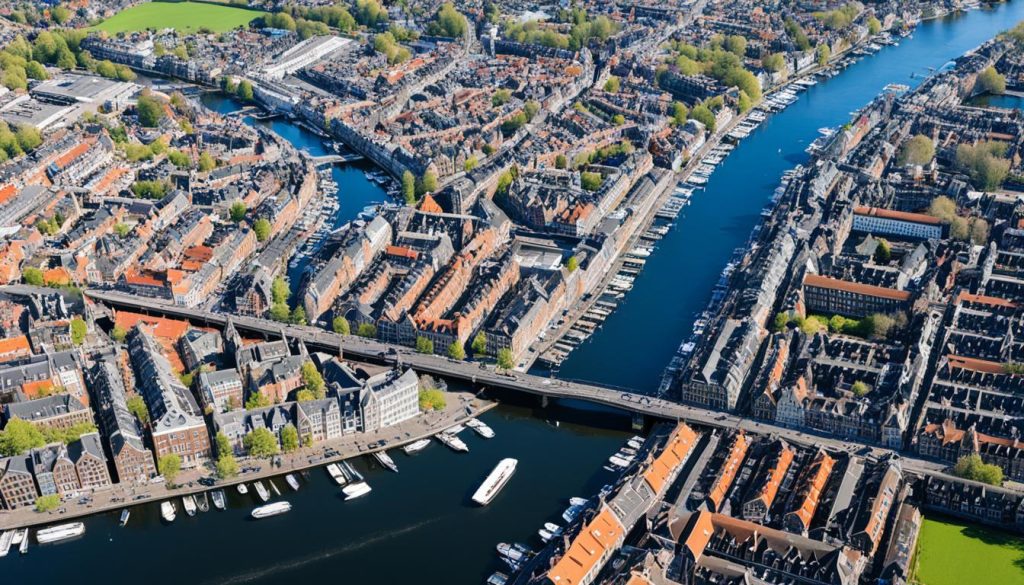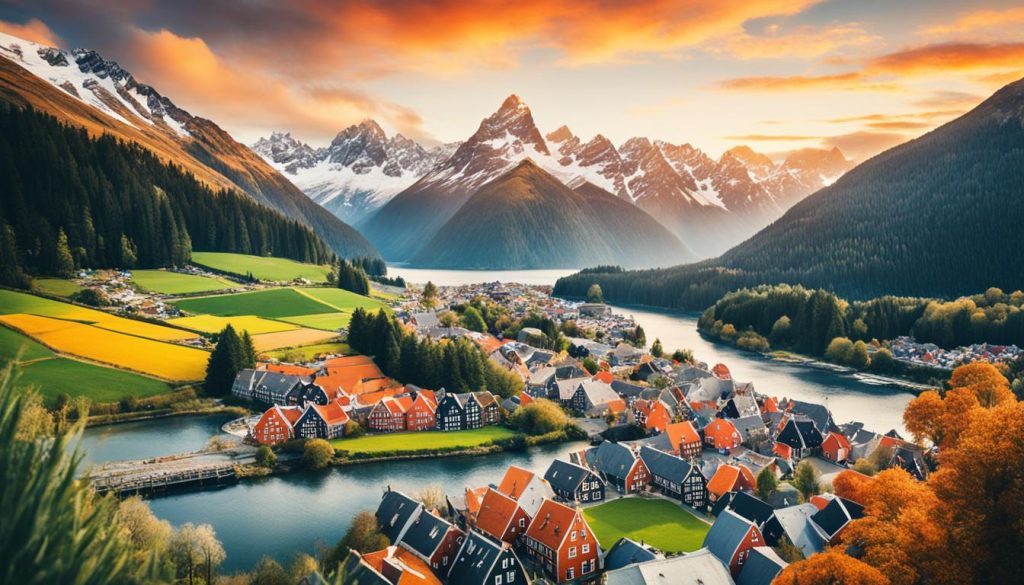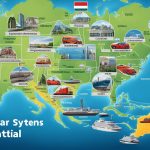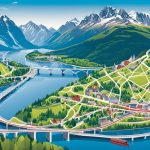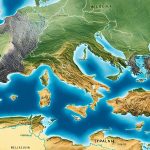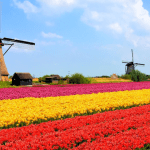Making the leap to live abroad is huge, filled with both thrill and unknowns. UK folks contemplating this might compare New Zealand’s life with working in the Netherlands. Each offers unique experiences, shaped by what one seeks and job chances.
When dreaming of moving, the beautiful sceneries of New Zealand or the Netherlands’ canals come to mind. But real life there comes from daily routines, community, and work culture. We aim to show the key considerations for making this big life move, focusing on the unique life and work aspects in each country.
Introductory Insights: Embracing the Differences
Moving to a new country brings its own set of challenges and fun adventures. This is especially true when getting used to the cultural differences at work and in daily life. Whether you’re moving to the beautiful scenes of New Zealand or the lively Dutch lifestyle, learning from those who’ve been there before can make adjusting easier.
People who have lived abroad say that the Dutch are very straightforward in how they talk, while New Zealanders are more laid-back and friendly. These ways of behaving affect everything in these countries. From how people do business to how they chat casually at work.
- When entering these new places, it’s important to keep an open mind. Being ready to share and adapt your own cultural ways can help close the gap.
- Understanding local customs is not just about fitting in. It’s about respecting the variety that comes with living somewhere new.
- Having access to advice from other expats can prepare you for the cultural differences you’ll encounter. This can make initial culture shock less intense.
Looking at stats about life in each country shows what people value in reality. For example, New Zealand is often praised for its great work-life balance.
- Talking to expats shows this balance means spending time with family and on personal interests is very important. It fits well with the culture’s overall vibe.
- On the other hand, the Dutch work culture is more formal. Being on time and direct is seen as professional and respectful.
Different cultures have unique things to offer, whether it’s the practical work culture in the Netherlands or New Zealand’s easy-going lifestyle. Being open to these differences and eager to learn from them is key for expats to succeed.
The Lifestyle Contrast: Kiwi Ease vs Dutch Directness
Kiwis enjoy a laid-back lifestyle with close-knit communities. This is different from the Dutch who are known for being direct in their social life. Each country values work-life balance, using holiday time and work benefits. These differences influence their social scenes and the fun they offer.
Cultural Attitudes and Social Norms
In the Netherlands, people value honesty and are direct in their dealings. This directness helps everyone understand each other better. Meanwhile, in New Zealand, folks prefer a gentler way of communicating. They focus on friendliness and making everyone feel part of a community.
Work-Life Balance and Holiday Entitlements
New Zealand and the Netherlands both support a good balance between work and life. However, they offer different work perks and holidays. Kiwis get plenty of time off to enjoy the outdoors. The Dutch also have many vacation days, highlighting the importance of rest and leisure.
- Minimum holiday entitlements and additional leave provisions in New Zealand
- The Netherlands’ unique approach to part-time work and parental leave policies
- Comparative analysis of employee satisfaction with work-life balance in both countries
Outdoor Activities and City Life
New Zealand’s vast landscape is perfect for outdoor adventures like hiking and skiing. The Netherlands might be smaller but it’s rich in city attractions and history, especially in places like Amsterdam. Both countries offer great activities, whether it’s enjoying New Zealand’s nature or exploring Dutch cities.
- Statistics on New Zealanders participating in outdoor recreational activities
- Insights into Dutch urban culture and the popularity of cycling and canal tours
- The balance between urban exploring and community events in both countries
Cost of Living: Expenses Compared
Thinking about moving abroad? It’s key to look at how costs stack up between your current place and where you might go. If you’re weighing up living in New Zealand versus the Netherlands, knowing the cost differences is vital. This helps plan your finances better for living abroad.
Living expenses in both nations are shaped by several things. That includes the cost of homes, what food costs, getting around, and fun activities. Reports from sources like Numbeo show that while some expenses might be more in one country, others could be less. This means your living costs could balance out, depending on how you live and spend.
- Groceries and eating out show big cost differences between the two countries.
- Housing and bills are a big part of monthly costs for those moving abroad.
- Getting around, through public or own transport, varies in expense, affecting your budget.
- Spending on fun and entertainment can also change the cost of living picture.
Prices change over time, influenced by trends in inflation. Staying updated on these shifts is crucial for a solid budget. Also, finance guides for expats in each country give useful advice. They help you handle money wisely in a new place.
In short, comparing living costs in New Zealand and the Netherlands doesn’t give a straightforward answer. It depends greatly on your situation and how you choose to live. Anyone looking to move should think carefully about their budget. You must consider costs in both countries to make the move financially smooth.
Housing Markets: From Auckland to Amsterdam
We explored housing markets in Auckland and Amsterdam. We looked at real estate, rental markets, and life quality. This is key for those thinking of renting in New Zealand or buying in the Netherlands. Housing for expats differs a lot between these places.
Property Ownership and Rentals
Expats often search for the best living spots. Auckland has a laid-back rental scene, unlike Amsterdam’s strict rules. Each city offers unique challenges and chances for foreign property owners and renters.
- Assessing the flexibility and restrictions within the rental sectors of both countries.
- Considering investment potential when buying property in fast-paced markets.
- Evaluating long-term versus short-term renting for expatriates.
Affordability and Housing Quality
Affordable housing is a big issue. People want good homes, but prices can be high. Local reports help people decide where to live. They look at living conditions, location, and nearby features.
- Global real estate affordability surveys to compare costs between Auckland to Amsterdam.
- Investigations into how housing prices impact the expatriate’s quality of life.
- Examining the balance between affordability and housing quality.
Urban Planning and Community Spaces
City development affects public areas in Auckland and Amsterdam. Good planning makes lively communities and great public spots. These places become part of daily life. They’re important for both locals and expats.
- Analysing the approach to community design in influencing social interactions.
- Discussing the integration of public spaces into residential planning.
- Unveiling urban renewal projects that redefine living and working environments.
Employment Opportunities: Sectors in Focus
Expatriates all over aim for stable, fulfilling jobs. The job market in New Zealand and the Dutch industry sectors present diverse opportunities. It’s about finding a role that fits one’s skills in a growing industry.
In New Zealand, sectors like technology, tourism, and agriculture are growing. The Dutch market shines in logistics, technology, and sustainable energy. For job seekers, these areas are great for career building.
To decide between New Zealand and the Netherlands, look at growth forecasts in each sector. This info, along with advice from career advisors, helps expats in their job search.
- Reports show IT jobs are on the rise in Auckland and Wellington, New Zealand.
- Amsterdam’s tech scene is booming, attracting startups and big IT firms.
- Both countries have good opportunities for healthcare workers, but local certifications might be needed.
- New Zealand’s sustainable agriculture offers roles for those who love nature and farming.
- The Netherlands excels in logistics and supply chain management, thanks to its trading history.
Recruitment agencies in New Zealand and the Netherlands match expats with suitable sectors. Building connections with these agencies is a good move towards a rewarding career in these countries.
Economic Stability: A Comparative Analysis
Let’s explore how New Zealand and the Netherlands achieve economic stability. These countries show strong growth and stability. They perform well globally due to their economic strengths.
We will examine their economic indicators and job market dynamics. This will highlight how they compare to other nations.
GDP Growth and Unemployment Rates
GDP and unemployment rates reveal a country’s financial health. New Zealand and the Netherlands have resilient sectors. This leads to steady economic growth.
Their job markets have adapted well to global changes. This keeps employment rates high and workers confident.
Major Industries and Employers
Both countries boast key industries driving their economies. From tech firms to agriculture, they offer diverse jobs. These sectors strengthen their economies and job markets.
Job Security and Workers’ Rights
Job rights and protection laws are essential for economic stability. New Zealand and the Netherlands excel in protecting workers. This promotes a healthy work environment and attracts skilled talent.
- The latest data from World Bank and IMF highlights trends and forecasts that shape fiscal policies.
- Statistical bureaus disclose essential information on GDP growth and the unemployment spectrum.
- Major players in each country’s economy are dissected in industry reports to showcase their impact and reach.
- Comparative legal analysis and union publications throw light on how employment rights are stringently protected.
Educational Systems: Shaping Future Generations
Families looking abroad focus on education quality. They compare New Zealand schools with Netherlands higher education. This comparison looks at how they shape young minds and futures. Different teaching methods and goals are seen from New Zealand’s classrooms to the Netherlands’ lecture halls.
The Organisation for Economic Co-operation and Development (OECD) gives a useful benchmark for education systems. It checks things like academic success, fairness, and the learning setting. The reports show where New Zealand and the Netherlands stand globally.
- New Zealand schools are top at encouraging creative thinking and offering a broad education. This prepares students for various future paths.
- On the other hand, the Netherlands higher education is known for its high academic standards and research focus. It’s great for students wanting advanced degrees.
Expatriate forums share stories of studying in these countries. They talk about the friendly atmosphere in New Zealand and the independent study style in the Netherlands. This shows the difference between the two education systems.
- In New Zealand, parents like how inclusive and supportive the schools are for all children.
- In the Netherlands, international students value the high-quality education and English-taught courses, even though it’s a Dutch-speaking country.
Education experts share their thoughts on each country’s education system. New Zealand is praised for its inclusive policies and focus on both academic and practical skills. The Netherlands is admired for its strong academics, global outlook, and emphasis on critical thinking.
Choosing where to study abroad depends on matching your education goals with what each country offers. It’s about the best fit for you – academically, culturally, and socially. This decision will help shape the future leaders of the world.
Climate and Environment: Nature’s Influence on Living
Choosing between New Zealand’s stunning landscapes and the Netherlands’ beautiful terrains is tough. It’s not just about preferring one climate over another. It’s about understanding how the weather affects our lives. This includes outdoor activities, green efforts, and our overall impact on the planet. It’s vital for living in harmony with our environment.
Weather Patterns and Seasonal Activities
Each season offers special outdoor activities fitting the country’s weather. While reports give us data, tourist boards show how locals embrace each season. In New Zealand, summer means beach trips and hiking. In the Netherlands, winter brings cosy cafés and ice-skating. The weather strongly influences our fun.
Environmental Policies and Sustainability Efforts
New Zealand and the Netherlands stand out for their green actions. They work hard to save the natural world and promote eco-friendly living. Governments, NGOs, and communities work together. They aim to lessen our environmental impact and protect the future.
Geography’s Impact on Lifestyle
The geography of these countries affects how people live. New Zealand has mountains and volcanoes, leading to unique lifestyles. The Netherlands has flat land and canals, creating different challenges. Stories from both lands show how nature shapes our living, highlighting the importance of geography in finding balance with nature.
Healthcare Services: Securing Wellbeing
When you move abroad, finding good healthcare becomes a big deal. People thinking about living in New Zealand or the Netherlands look closely at their healthcare systems. The World Health Organization gives us helpful info about healthcare quality in these countries. It’s crucial for expats to understand this to get the best care in their new home.
In both places, you find strong health systems supported by public funding. Yet, getting health insurance is key for expats, affecting both their mental peace and budget. New Zealand has a special scheme, the Accident Compensation Corporation, which covers injuries. This is quite unique on a global scale. On the other hand, the Netherlands requires everyone to have health insurance. This guarantees access to many medical services through a basic insurance plan. The Dutch really plan their healthcare well.
High patient satisfaction rates in both countries show they’re committed to great healthcare. But expats will find differences in how easy it is to get care, depending on where they live, their visa, and health needs. New Zealand, with fewer people, often has shorter wait times for treatments. The Netherlands offers many medical facilities, giving you lots of options. It’s smart to look at insurance details and expat health tips to get a clear picture of each system.
- Evaluate the healthcare system rankings and reports for both countries.
- Analyse patient satisfaction and the perceived quality of healthcare services.
- Assess the health insurance requirements and options available to expatriates.
- Consider healthcare accessibility and how it varies in rural versus urban settings.
- Discuss the importance of understanding local healthcare policies for expat health care planning.
Choosing New Zealand or the Netherlands is a big decision that affects your health care and happiness. Careful comparison of the healthcare systems and thinking about personal needs lets expats make this choice with confidence.
Immigration and Settling In: Policy and Processes
Many choose to move abroad, drawn by the promise of a fresh start. This exciting change is full of hopes and dreams about blending into a new society. But, the process of settling in is tricky. It involves understanding a lot about immigration rules, visa needs, and how to become a permanent resident. Newcomers must get their documents in order and know what public services they can use.
Visa Regulations and Permanent Residency
Starting a new life begins with knowing about visa rules. This is crucial in places like New Zealand and the Netherlands. The journey to permanent residency usually starts with a temporary stay. During this time, officials check if all rules are followed. It’s important to pay careful attention to legal advice to ensure a hassle-free move to long-term living.
Integration into Society and Access to Services
Settling in isn’t just about finding a home. It’s also about becoming part of the community. This includes everything from setting up a bank account to learning local ways and laws. Access to public services is key during this time. It connects newcomers to vital resources like health care, schools, and transport. There are government and charity programs to help expats join in fully with society.
Cultural Acclimatisation and Support Networks
Adapting to a new culture is a journey full of discovery and change. It means being open to new customs while keeping your own traditions. Expats find support in groups and clubs offering help. These places are great for getting advice, sharing stories, and growing through new cultural experiences.
Transport and Infrastructure: Getting Around
Deciding to move can heavily depend on public transport systems. Both New Zealand and the Netherlands have focused on infrastructure quality, travel convenience, and sustainable transportation.
In New Zealand, the beauty of its landscapes is appealing. Yet, travelling great distances can be a hassle. The country is improving its public transport for better urban and rural access.
Meanwhile, the Netherlands is known for its excellent public transport. Its systems are timely, wide-reaching, and integrated. Features like bike paths, journey planning apps, and vast rail networks help people travel easily.
- Public transport accessibility and coverage.
- User satisfaction levels and areas for improvement.
- Current investment in infrastructure projects focused on sustainability.
People in the Netherlands are happy with their transport. It’s easy to use and of high quality. In New Zealand, cities like Auckland and Wellington are seeing better public transport. But, there’s room to improve to match Europe’s standards.
Future plans in both countries aim to upgrade infrastructure quality. This includes making vehicle fleets electric, expanding public transport, and using green tech. Such steps will lead to a sustainable transport future.
Social Welfare: Security Nets Compared
Looking into social welfare in New Zealand and the Netherlands shows us their impact. These countries have strong systems for public well-being. They offer support differently, especially in emergencies.
Pensions and Benefits Systems
Pension schemes and benefits show clear differences. New Zealand has a superannuation system for all eligible residents. The Dutch system uses a state pension and employee schemes, supported by both employers and employees. This shows how each country approaches social security.
Access to Social Services
Welfare access and community support vary. New Zealand focuses on including everyone. The Netherlands tailors support to fit individual needs. Both aim to strengthen their communities but do so in unique ways.
Government Support During Crises
How a country manages crises shows its strength. Both New Zealand and the Netherlands work hard to offer urgent help and keep people safe. They plan carefully and act quickly to protect everyone during disasters.
Conclusion
Moving to another country isn’t just about a new place. It’s about considering different aspects like lifestyle and job opportunities. Looking at New Zealand and the Netherlands shows us many sides of life abroad. Each offers unique cultural, economic, and environmental views.
Choosing between New Zealand’s relaxed beaches and the Netherlands’ active city life is a big decision. Both places have their own way of balancing work and leisure, and how people connect. Think carefully about what matters most to you and your career goals. Do you prefer New Zealand’s outdoor life or the Dutch way of living with strong support systems?
Deciding to move abroad is a huge step, shaped by personal and practical reasons. We hope our insights help you make a confident choice. Let the differences and similarities between New Zealand and the Netherlands aid your decision. Moving is more than a new address. It’s about starting a new chapter filled with adventure, growth, and new experiences.


